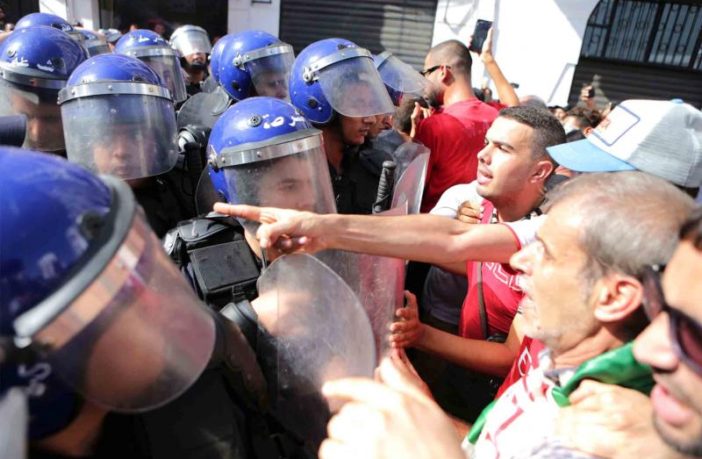The Arab Weekly
Gaid Salah and his backers insist that Algeria needs a presidential vote by December 12, saying protesters’ vision would lead to instability and insecurity.
Algerian Army Chief-of-Staff General Ahmed Gaid Salah, hoping to finalise a long-delayed presidential vote, warned that protesters were being influenced by “unknown entities” hatching a “malicious scheme” to derail the process.
For eight months, Algerians have peacefully demonstrated, calling for broad government reforms and voicing opposition to snap elections. They say they want a transitional period that would allow time to strengthen institutions and for a legitimate opposition to form.
Gaid Salah and his backers insist that Algeria needs a presidential vote by December 12, saying protesters’ vision would lead to instability and insecurity. Gaid Salah issued strong warnings against challenging the process.
“The strict rigour of the law will punish any person who attempts to block this determining electoral process,” Gaid Salah said. “Those colluding with the gang will fall one after the other with the passing days because a traitor will be betrayed by his own acts one day or the next.”
“The gang” referenced by Gaid Salah is likely an alleged network headed by former intelligence chief Mohamed Mediene.
Mediene was jailed in September along with other high-level officials, including Said Bouteflika, the brother of ousted President Abdelaziz Bouteflika; General Athmane Tartag, an intelligence chief who worked directly under Bouteflika; and Workers’ Party Secretary-General Louisa Hanoune, on charges of “plotting against the state and undermining the army.”
In an apparent effort to gain international support, the Algerian government reached out to foreign parties with which it has traditionally been at odds.
Amar Saadani, a Gaid Salah ally who formerly led the National Liberation Front, made a landmark gesture of support to neighbouring Morocco, indicating Algiers could drop its backing for the Polisario Front after elections.
Sahrawi rebel national liberation movement Polisario Front is seeking an independent state in Western Sahara, which Morocco claims as an integral part of the kingdom.
The Algerian government also endorsed a draft energy law that is more favourable to foreign investors, particularly from the United States. Algerian Energy Minister Mohamed Arkab said the text was drafted “after consultations with five American energy companies.”
Algerian leaders had long balked at allowing US firms access to the country’s oil and gas sector, enacting prohibitive legislation to exclude most foreign investors.
Algerian opposition leaders and protest figures viewed the foreign policy manoeuvres as efforts to shore up overseas support and avoid isolation as the government moves forward with elections.
Algeria scrapped planned presidential elections in April and July as mass protests led to a lack of viable candidates. Opposition leaders warned that proceeding with a vote without building a national consensus would increase “popular discontent” and weaken the “regime’s legitimacy.”
“It is unconceivable to envisage holding free and transparent elections in these circumstances,” said a statement from 18 opposition leaders, including former Foreign Minister Ahmed Taleb Ibrahimi, former Prime Minister Ahmed Benbitour and former diplomat Abdelaziz Rahabi.
Algerian think-tank Nabni, which previously worked under the government, issued a statement saying “ending the current regime” would deprive it of the mechanisms used to exert “unchallenged control of all levers of the economic, social and political life of the country.”
Saadani, however, said the elections would prove “less costly than not.”
“There is no total profit but total loss may occur,” he said. “It makes more sense to elect even a third-president. We will take that as a transition period.”
“A transition period without elections means that the army takes over the power. It is clear that electing a president is better than the other possibility,” he added.
Saadani hinted that electing a president would help improve relations between Morocco and Algeria, breathing new life into an Arab Maghreb Union paralysed by their tensions.
“I think that Algeria has spent huge amounts of money to support the so-called Polisario, which has done nothing to unblock the impasse,” he said.
“The relation between Algeria and Morocco is far more important than this issue. I think that the juncture is auspicious because there is the election of a new president in Tunisia and a new system and Algeria is gearing up for the election of a president and a systematic change.”
“All this will contribute to building unity in the Maghreb as the forefathers of nationalism in the region had dreamed of,” Saadani said.

Written ByLamine Ghanmi
Lamine Ghanmi is a veteran Reuters journalist. He has covered North Africa for decades and is based in Tunis.







